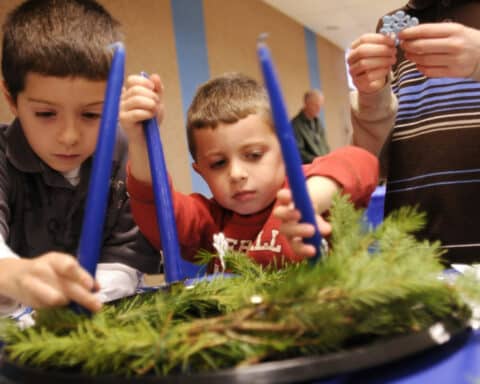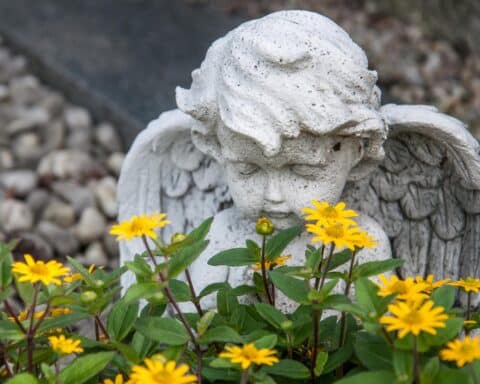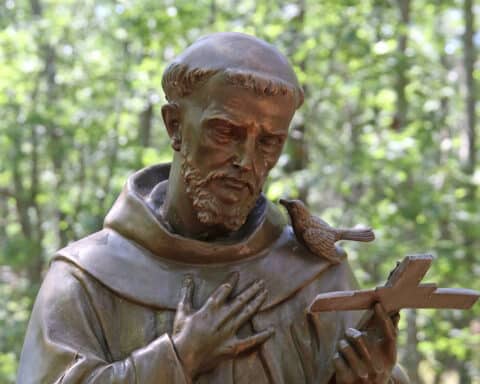
— Paul VanHoudt, Erie, Colorado
Answer: In terms of answering your question, some definitions and distinctions should be made. You are correct in asserting that pets have a soul. The term “soul” technically understood is the animating or life-giving principle of any living thing. Hence animals have souls, even plants do, and clearly we have souls. When the soul (or animating principle) mysteriously departs, the physical aspects of the living thing cease to function and fall into decay and disintegration. What makes the human soul unique is, as you also point out, we have rational souls. It is that part of our soul we often call our spirit. The spirit is not a third aspect of our being. It is part of our soul.
Having rational souls distinguishes us dramatically from animals such as mammals and primates. Some today assert that we are not very different at all from the animals. But this is demonstrably untrue. Physically we have many similarities with other mammals: lungs, eyes, heart, limbs, etc. But the similarities stop there. You will know something by its fruits, and it is clear that animals lack a rational soul while we have one. We are highly organized and have made vast technological progress over the centuries. We have governments, universities, libraries, hospitals, courts, cathedrals and endless technologies. We debate justice, hold each other accountable, reward good and punish wrong-doing and mourn our dead. We are innovative and always asking “why?” We have been to the moon and back and search the stars. The list could go on, but animals, even the highest primates, do none of this and have shown no progress toward such things. This demonstrates that they do not have rational souls whereas we humans do.
As to your question, it is revealed to us by God that we have immortal souls and, further, that our bodies, too, will rise in a perfected and glorified state. This is not said of the animals, at least not every individual animal. So the most common and “safe” answer is that when animals die they just cease to exist.
However, this is not definitively taught, and there are indications that animals, at least in some general way, will partake of the new creation at the second coming. For example, Isaiah described the Messianic age as a time when “the wolf shall be a guest of the lamb, and the leopard shall lie down with the young goat; The calf and the young lion shall browse together, with a little child to guide them. The cow and the bear shall graze, together their young shall lie down; the lion shall eat hay like the ox. The baby shall play by the viper’s den, and the child lay his hand on the adder’s lair” (Is 11:6-9). St. Paul also writes that “creation awaits with eager expectation the revelation of the children of God; for creation was made subject to futility, not of its own accord but because of the one who subjected it,o in hope that creation itself would be set free from slavery to corruption and share in the glorious freedom of the children of God” (Rm 8:19-21). And finally St. John in his vision of the new creation saw Christ seated in glory, and Christ said to him, “Behold, I make all things new” (Rv 21:5).
This does not necessarily mean that every cow or hyena that ever lived will come back to life, but only that animals, as a group and in varied species, will partake of the new creation after the Second Coming.
Therefore I think our pets will, as you state, receive a special “divine consideration” since they were part of our lives. I cannot know this for certain, but I think the argument can be made. Further, in heaven, we will live in eternity, in the fullness of time. And while we may not experience the comprehensive now that God does, it would seem we do have some access to our past, which includes our pets. How we will experience all this is mysterious, and so I pose this whole answer as speculative theology.
There is however, one danger to avoid. We must not reduce heaven’s joys to having earthly things. Heaven is far greater than any thing we can imagine, be it pets or any earthly joy.
Msgr. Charles Pope is the pastor of Holy Comforter-St. Cyprian in Washington, D.C., and writes for the Archdiocese of Washington, D.C. at blog.adw.org. Send questions to msgrpope@osv.com.





